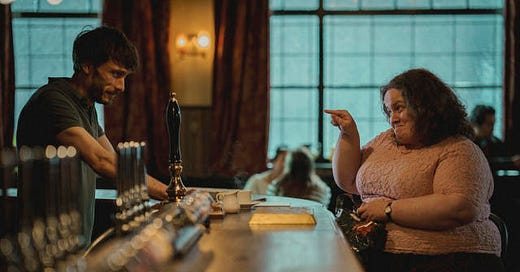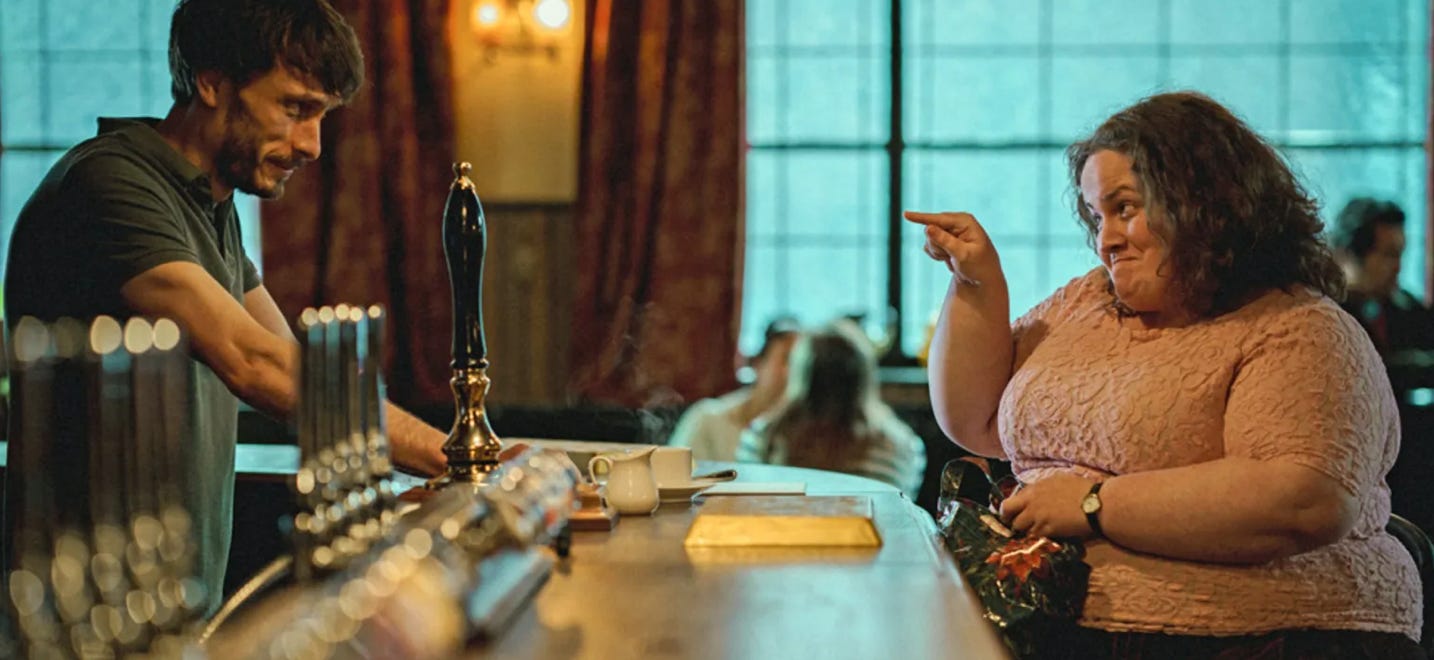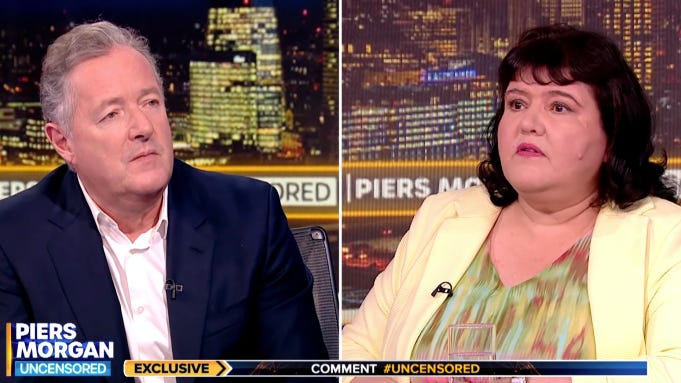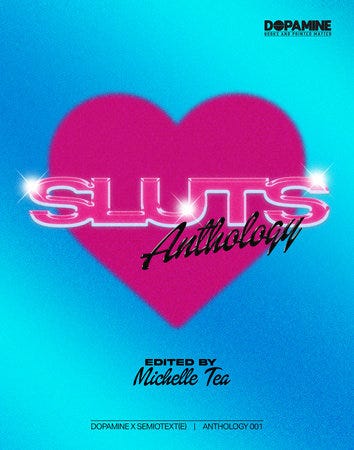Okay screw my weekly Q&A, I have to talk about Baby Reindeer.
I don’t even remember the last time I was anywhere as deep into a well of pop culture drama as this. ICYMI, New York’s hottest club is the Netflix dramedy adapted from Scottish performer Richard Gadd’s stage play of the same name. He created the series based on his own personal experience with an older female stalker (named “Martha” in the show)—a bizarre and dangerous, but also sort of mutually parasitic dynamic, which he entertained in the wake of multiple sexual assault incidences by his mentor, a trauma that catalyzed a period of self-destruction. Was that a decent one-line summary? It’s a devastating emotional roller coaster of a show made even more gripping by the fact that episode 1 opens with the statement “This is a true story”—not “based on a true story,” or “inspired by true events,” but this HAPPENED. Personally, I interpreted the series to be a piece of autofiction. I found it well paced and beautifully acted, and clearly so did millions of others because it swiftly shot to Netflix’s #1 spot. It’s now been streamed well over 55 million times.
Invariably, with the attention came a throng of morbidly curious fans hellbent on sleuthing the real people behind the characters in the style of Gabby Petito’s TikTok vigilantes. One result? The unearthing of Fiona Harvey, the alleged “real-life Martha,” whom a number of reindeerinos discovered within a matter of days and began allegedly accosting online. In an uncannily Martha-esque display, Fiona began giving tabloid interviews, claiming that while she hadn’t yet watched the show, the character of Martha was unforgivably both too much like her (enough to bring on harassment) and not like her enough (Fiona was upset the actress playing Martha was too young and not even Scottish IRL lol. But also, more seriously, she denied that she’d ever stalked or harmed Richard like Martha does in the show). Fiona vowed to sue both Netflix and Richard for defamation, a claim that could theoretically be viable since they didn’t do all that much to obscure her identity (I’ve learned through the legal vets of my books that if a person you’re writing about is both shameless and litigious… say, a stalker type… whether you’re framing the piece as autofiction or true crime or even straight-up fiction, you’d be wise to change as many identifying details as possible without compromising the story, and to disclose that measure to the audience. Just so you don’t have to deal with their bullshit. I also know that libel laws in the UK favor plaintiffs more than they do in the US. Then again, Netflix is rich enough that they can take all kinds of risks). Of course, no matter what, defamation suits only work if the statements made were false.
The accuracy of Fiona’s claims is now a big mystery many onlookers have embraced. Presumably, the necessary receipts should be easy enough for a legal team to find. But I’ll never get over the irony that Baby Reindeer was a piece of art imitating life, and now life is doubling back to imitate art. I don’t know, to me, it does seem somewhat stalker-y (or at the very least counterproductive) to use a television character you claim has nothing to do with you as an excuse to re-enter the creator’s life, all the while calling him psychotic among other things on an international stage, rather than just filing your lawsuit, lying low, and allowing your lawyers to handle it as you wait for the storm to pass. But I suppose that’s not really the Martha way. I mean, Fiona?
Then again, at the very same time, wasn’t it odd that Richard Gadd would continue to pursue this Baby Reindeer project for so many years in so many forms, knowing on some level that if it became successful enough, it would inevitably invite “Martha” back into his life? I have to wonder why, knowing her disposition, he wouldn’t at least take some measures to prevent her resurrection? Or is Richard Gadd actually still somehow as infatuated with “Martha” as his character is in this show? Is this actually the toxic love story of the decade—both the real-life and audio-fictional versions? Proceeding through litigation would so clearly mirror the prosecution process in the show. Is this not the most meta story in TV history? My brain can’t give it up.
The media escalation culminated in one of the most queasy-making clickbait spectacles I’ve seen in recent memory: Quasi-canceled British broadcaster Piers Morgan invited Fiona onto his talk show, where he interviewed her for an hour, poking holes in some of her flimsy claims and denials, but ultimately offering a megaphone to a person who mental health commentators say might suffer from a delusion disorder.
Of course, I can’t comment on Fiona Harvey’s mental state (not formally anyway lol), but I do feel a little more confident weighing in on the Baby Reindeer fan dynamics. Witnessing the discourse unfold, I have noticed several of the cognitive biases I wrote about in The Age of Magical Overthinking quietly governing the behavior of sleuths and reporters. This is such a fascinating example of how our innate superstitions and irrational behaviors are clashing with the digital age, and how that can have weird legal repercussions for artists. If this show came out before the social media age, I doubt fans would’ve found Fiona Harvey so quickly, and there wouldn’t be the same drama or grounds for a suit. Then again, if this story happened before the social media age, “Martha” wouldn’t have been able to stalk someone via Facebook and Twitter at all!
Anyway, it’s all riveting to think about, and I wanted to share a bit of my cognitive bias lens with you below.
• Confirmation Bias: As soon as sleuths began looking for the “real life Martha,” certain evidence (such as similarly worded tweets) clearly pointed them to Fiona Harvey; but, confirmation bias also allowed fans to see things that weren’t truly there… like that the way Fiona held her drink was the exact same as the actress, or that their face shape is identical, which it isn’t. Confirmation bias also motivated Fiona herself to cherrypick what she wanted to see in Martha’s character and partially explains why her arguments about the depiction (that Martha is both too similar to her but not similar enough) feel so contradictory.
• Proportionality Bias: This is the cognitive bias that powers conspiratorial thinking; it’s the idea that big events must have big causes and that hostile intentions lurk everywhere. During times of danger (or perceived danger), proportionality bias is what causes us to think that the world is out to get us; it creates a level of paranoia. This bias can explain why Fiona, and also some fans, have concluded that Richard Gadd made the show specifically to seek revenge or reclaim power over her—because why else would he create a big Netflix series and make Fiona so easy to identify? During splashy public uproars like this, we tend to look for singular villains and on-purpose causes that are proportional to the outcome’s magnitude, often failing to consider that events unfolded as a result of a series of smaller accidents and oversights (perhaps that Gadd figured if his stage play didn’t cause issues, the TV adaption wouldn’t either; plus, he never expected it to be such a hit).
• Illusory truth effect: Our natural penchant to mistake something as true just because we’ve heard it multiple times is part of why it’s so dangerous to weaponize clickbait headlines. Studies show that even if a factoid is flat-out implausible or noted as dubious, if it’s repeated enough (like in tabloid headlines and forums), it becomes more familiar, and onlookers start to internalize it as true. By orchestrating an hour-long interview with Fiona, optimized for clickbait and drama, Piers Morgan set the stage for a tornado of potentially harmful rumors and speculation to spread online. This made what is actually important about this story (like Richard Gadd’s efforts to provide resources for male and nonbinary sexual assault survivors), as well as the real facts about the situation, even harder to uncover.
Would love to hear your analyses of the Baby Reindeer frenzy in the comments below!!!
The Magical Overthinkers podcast debuts this week! Become a paid subscriber to access episodes a day early and ad-free here on the newsletter :)
I am so excited about this show, which will be available on all major podcast platforms (as well as YouTube)! Links below. If you’d like to listen to early, ad-free episodes here on Substack, consider becoming a paid subscriber. The first episode drops tomorrow! You can watch and/or listen to the trailer now.
I have a piece in the new anthology, Sluts, edited by Michelle Tea.
It’s the debut publication from indie publisher Dopamine Press, operated by writer Michelle Tea. Contributors include writers you might know and love like Chloe Caldwell, Gabrielle Korn, and more, all writing on the topic of sluttishness. From the publisher: “From hideous and terrifying first encounters to postapocalyptic polyamory, from unionizing sex workers to backstage tableaux of sex and drugs and rock and roll, SLUTS’s stories probe the liberating highs and abject lows of physical abandon.” My essay is the very first piece in the collection, which is such an honor!
Catch me in LA this Wednesday.
What a delight to join Traci Thomas from The Stacks podcast for her live event series, One for the Books! Tickets below.
I’m also coming to the Bay Area!
Bay Area residents, I’d love to see you at a free book talk I’m doing at the Mill Valley Public Library on June 11 at 6:30, moderated by Luminaries author Kristin Keane. Just make sure to register beforehand!
This political interview was a cool change of pace.
I got to appear on former Obama aide Jon Favreau’s podcast “Offline.” He’s such an engaging interviewer! I also can’t believe how nice the comments are, especially for a video with such a spicy title.
MOVIE: Prime
I watched that mediocre new Anne Hathaway film The Idea of You, and it just made me want to rewatch this shamefully underrated 2005 romcom, starring Uma Thurman and Meryl Streep. Prime has similar themes (arty older woman falls in love with 20-something dreamboat), but it’s hotter, cooler, more clever, more believable, etc. It might actually be my favorite romcom of all time?
MUSIC: “There She Goes” cover by Hazel English
The song “There She Goes” by the La’s is super nostalgic for me (I’m pretty sure it’s on the soundtrack for Passport to Paris, which is my favorite Mary-Kate and Ashley move). Anyway, I am recently obsessed with this fresh cover, which puts an indie Sapphic spin on the song. Put it on your cozy Sunday morning playlists!
BEVERAGE: Trader Joe’s Sparkling Black Tea with Peach Juice Beverage
Generally I’m not in the cult of Trader Joe’s (their mass market junk disguised as quaint health food can’t fool me!!), but whenever I rediscover this bubbly tea, I’m like ughhhhhh okay you got me. Delicious, refreshing, and not too sweet. Kind of a perfect beverage.
DESSERT: The Charmery “Magical Overthinking” Ice Cream
This is just local to Maryland, but if you happen to be in my home state anytime this month, be sure to hit up this handcrafted ice cream shop, because I partnered with them to create a limited edition “Magical Overthinking” ice cream flavor! How cool is that??? The flavor is lavender-honey, punctuated with a shit load of sour candy powder… so, dreamy but unhinged, just like the book! It’s somehow SO good. And a portion of every sale goes to benefit the Leukemia & Lymphoma Society.












“There She Goes” isn’t in Passport to Paris but it IS in the iconic welcome-to-London montage in Parent Trap. Perhaps perfect evidence of a cognitive bias at work in the jumbling up of nostalgic films in a brain?
OMG Im 4 episodes in and it is wild!!!